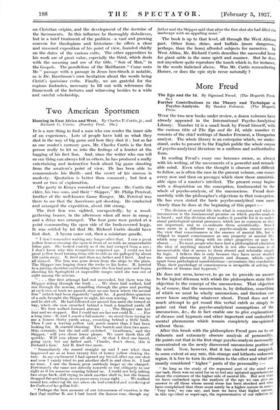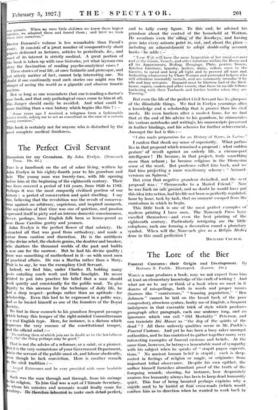More Freud
WITH the two new books under review, a dozen volumes have already appeared in the International Psycho-Analytical Library. Number 12 is a small book by Freud himself, with the curious title of The Ego and the Id, while number 11 consists of the chief writings of Sandor Ferenczi, a Hungarian analyst. The whole library is an enterprise which, we under- stand, seeks to present to the English public the whole corpus of psycho-analytical literature in a uniform and authoritative form.
In reading Freud's essay one becomes aware, as always with his writing, of the movements of a powerful and remark- able mind. Even when the thought is obscure and difficult to follow, as is often the case in the present volume, one conies every now and then on passages which show those unmistak- able signs of a master's intellect. The present essay begins with a disquisition on the conception, fundamental to the whole of psycho-analysis, of the unconscious. Freud deals carefully with the philosopher's objections to that conception. He has even stated the basic psycho-analytical case more clearly than he does at the beginning of this paper :—
" The division of mental life into what is conscious and what is unconscious is the fundamental premise on which psycho-analysis is based ; and this division alone makes it possible for it to under- stand pathological mental processes, which are as common as they are important, and to co-ordinate them scientifically. Stated once more in a different way : psycho-analysis cannot accept the view that consciousness is the essence of mental life, but is obliged to regard consciousness as one property of mental life, which may co-exist along with its other properties or may be absent. . . . To most people who have had a philosophical education the idea of anything mental which is not also conscious is so inconceivable that it seems to them absurd and refutable simply by logic. I believe this is only because they have never studied the mental phenomena of hypnosis and dreams, which—quite apart from pathological manifestations—necessitate this conclusion. Thus, their psychology of consciousness is incapable of solving the problems of dreams and hypnosis."
He does not seem, however, to go on to provide an answer to the logical dilemma with which the philosophers state their objection to the concept of the unconscious. That objection is, of course, that the unconscious is, by definition, something of which we must be wholly unconscious, and therefore can never know anything whatever about. Freud does not so much attempt to get round this verbal catch as simply to point out that the psycho-analytical assumptions of the unconscious, &c., do in fact enable one to give explanations of dreams and hypnosis and other important and undoubted mental phenomena which remain completely unexplained without them.
After this brush with the philosophers Freud goes on to an elaborate and extremely obscure analysis of personality. He points out that in the first stage psycho-analysis necessarily concentrated on the newly discovered unconscious portion of the mind. Now, however, that it has charted and mapped, to some extent at any rate, this strange and hitherto unknown region, it is free to turn its attention to the other and what are usually considered " higher " parts of the personality :— . " So long as the study of the repressed part of the mind was our task, there was no need for us to feel any agitated. apprehensions about the existence of the higher side of mental life. But now that We have embarked upon the analysis of the ego we can give an ahswer to all those whose moral sense has been shocked and who Wave complained that there must surely be a higher nature in man : Very true,' we can say, and here we have that higher nature, in this ego-ideal or super-ego, the representative of our ralittion to our parents. When Aro were little children-we .knew- these-higher natures, we admired them and feared thorn ; and later we took them into ourselves."
tor Ferenezra volume is less remarkable -than Freud's' y. It consist i of'a. great number of comparatively short ers delivered as lectures, articles to periodicals, &c., and nest of its interest is strictly medical. A great portion of he book is taken up with case histories, yet what layman can deny the fascination of reading psycho-analytical eases? . These stories, of real life, at once fantastic and grotesque, and -et utterly matter of fact, cannot help interesting one. No ioubt if one continually read such stories one might run the anger of seeing the world as a gigantic and obscene lunatic
sylum. Bur so long as one remembers that one is reading a doctor's
icase book, and that only pathological cases come to him at all, :this danger should easily be avoided. And _what could be ;more thrilling than a case history which begins like this ?
"Some yearn ago I received a telegram from a fashionable NVinter resort, asking me to act as consultant in the case of a certain
This book is certainly not for anyone who is disturbed by the most complete medical frankness.
:youlig countess."



























































 Previous page
Previous page